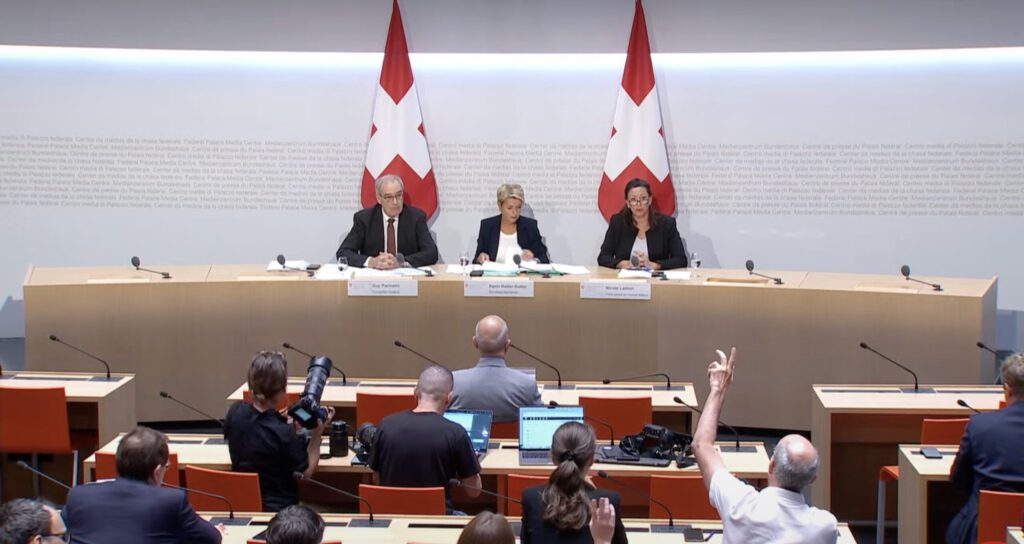
Switzerland is upset about the erratic US President Trump, even though he is merely continuing with his strategy. The problems clearly lie on the Swiss side.
Swiss President Karin Keller-Sutter is wrongly blaming US President Donald Trump for the debacle surrounding the 39 percent US punitive tariffs.
In reality, he has done nothing more than continue his well-known strategy of getting as much as possible out of other countries.
Consistent pattern
The Americans had signaled that a phone call between Keller-Sutter and Trump would be helpful regarding a deal, the president explained at a media conference this week.
This should have set off alarm bells, because this approach by the US has long been known.
Trump had already used precisely such meetings to corner Ukrainian President Volodymyr Zelensky. Those images were seen around the world.
Trump also confronted South African President Cyril Ramaphosa at the White House with allegations of discrimination against white farmers and demanded explanations.
And those images were also beamed around the world.
Fed chief taken by surprise
Trump then played the element of surprise with his current main opponent, US Federal Reserve Chairman Jerome Powell.
During a tour of the new Federal Reserve Bank Fed building, Trump pulled out a bill showing budget overruns on the construction projects in front of all the cameras and exposed Powell, who shook his head in disbelief.
More images were seen around the world.
Syria versus part of Ukraine
In Switzerland, details of the phone call with President Keller-Sutter initially remained secret.
But then the Americans, with their indiscretions, and not least US President Trump himself with an interview, ensured that the heated discussion did not fail to produce an impact.
Reasons for the regular approach taken by Zelensky, Ramaphosa, Powell, and Keller-Sutter are quickly enumerated.
In the case of Ukraine, Russia’s territorial claims are at the forefront, which Trump promised Russian President Putin in return for Syria, but has not yet been able to fulfill.
Now, however, Russia and the US seem to have found some way forward with a pending summit meeting in Alaska.
Increasing pressure on Powell
In South Africa’s case, the issues at stake are raw materials and the country’s lawsuit against Israel before the International Criminal Court on charges of genocide against the Palestinians.
South Africa traditionally supports the Palestinians because of its history of apartheid. However, this should be toned down.
In Powell’s case, the US president’s interests are clear. Trump wants to bring about an interest rate cut in order to refinance the massive national debt more cheaply. That is why he is constantly increasing pressure on the Fed chairman.
Public discrediting causes the Fed to lose some of its credibility, so perhaps Powell will throw in the towel in the face of public humiliation.
Switch to France’s Rafale possible
And what about Switzerland? Well … the country has always bought its way out of problems in the past. Why should this time be any different?
The “Agreement in Principle” that Swiss negotiators had negotiated with the Americans was only a first step.
However, the Americans are driving up the price, as Keller-Sutter herself sheepishly admitted at the press conference.

But secondly, Switzerland still has a lot of stuff to figure out. The extra cost of $1.3 billion for buying US F-35 fighter jets is just part of it.
It did not escape the attention of the US that Keller-Sutter personally asked French President Emmanuel Macron whether Switzerland could still switch to buying the French Rafale fighter jet.
So, a humiliation for Keller-Sutter was needed.
Affront to the US
Delivery delays and cost overruns by the US for the F-35 and the Patriot air defense system, as well as high demands for offset deals from Switzerland, also play a role here.
Switzerland still needs ammunition for the Patriot system – here too, the Americans increased the pressure on negotiations with their punitive tariffs and are virtually softening up Switzerland.
But Switzerland’s foreign policy also plays a role in this act of revenge. Foreign Minister Ignazio Cassis thwarted the plans of the Israelis and Americans to control the supply of goods to the people in the Gaza Strip via a new Swiss foundation.
At the same time, Switzerland moved closer to France and Great Britain in recognizing Palestine as a state. This is considered an affront to the US and must be somehow punished.
Quickly improving the offer
Keller-Sutter, the Department of Economic Affairs headed by SVP Federal Councilor Guy Parmelin, and the State Secretariat for Economic Affairs (SECO) have essentially walked right into a trap unprepared.
This happened even though this US strategy is now well known worldwide.
Now they want to work with the Swiss economy – mainly the pharmaceutical companies Roche and Novartis – to develop an expanded offer to the US. But Keller-Sutter and Parmelin should have done that before the phone call.
But now the damage has been done, and it will be very expensive to repair.
Collecting investment commitments
The Federal Council wants a regulated relationship with the US, Keller-Sutter openly declared. But that means nothing other than Switzerland paying whatever the American superpower wants.
As reported by muula.ch, Trump is continuing with his plan undeterred.
Unemployment must first rise so that the US Federal Reserve reduces key interest rates as quickly as possible. At the same time, the inflation rate must remain as constant as possible or, better still, fall.
Until then, the US is collecting as many investment commitments as possible, which Trump can then use to flexibly pull the US economy out of the “mud.”
August 10, 2025/kut./ena.




